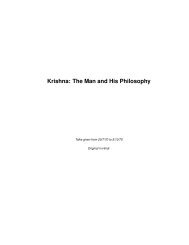Hyakujo: The Everest of Zen, with Basho's Haikus - Oshorajneesh.com
Hyakujo: The Everest of Zen, with Basho's Haikus - Oshorajneesh.com
Hyakujo: The Everest of Zen, with Basho's Haikus - Oshorajneesh.com
You also want an ePaper? Increase the reach of your titles
YUMPU automatically turns print PDFs into web optimized ePapers that Google loves.
CHAPTER 4. LIE DOWN AND WITNESSOne <strong>of</strong> my friends has sent me a picture from Korea. Just a line, and then another line making across.... and two dots underneath the first line, the cross. And he said, this means that in one housetwo women is a crucifixion – that cross; in one house two women is enough – a war, a constantwar. But if you have to remember these kinds <strong>of</strong> pictures, it is going to take years. <strong>The</strong> alphabetmakes it easier. <strong>The</strong> more modern alphabets have fewer characters; for example, Sanskrit has fiftytwo,English has only twenty-six. Everything non-essential has been taken out, so that the thingbe<strong>com</strong>es easier and simpler, direct and clear-cut, giving only one meaning. Old languages, whetherpictorial or alphabetical, have a beauty. That beauty is that each word can be used in many ways,<strong>with</strong> many meanings. It gives great freedom to the poet.For example in Sanskrit the word ‘go’ means cow, and it also means the ray <strong>of</strong> the sun; it has twelvemeanings in all. <strong>The</strong> English word ‘go’ is exactly the Sanskrit word that has entered into English.Why has it taken the meaning <strong>of</strong> going in English? In Sanskrit it also had the meaning <strong>of</strong> going,because the cow goes every morning to the field, then goes back home every evening. And in thosedays the cow was so important for nourishment, for agriculture, that its <strong>com</strong>ing and going becamethe meaning <strong>of</strong> the word ‘go’.Thirty percent <strong>of</strong> the words in English are from Sanskrit, but moving from Sanskrit to English, theyhave be<strong>com</strong>e fixed. Now ‘go’ in English exactly means one word, has one meaning. In Sanskrit itstill means twelve words, has twelve meanings. <strong>The</strong> poet has more freedom <strong>with</strong> the old languages.Science cannot afford old languages. It needs a very definite meaning, not just a vague idea thatcan be translated in many ways. This word ‘rest’ is used strangely by <strong>Hyakujo</strong> to mean meditation,but very rightly. To be <strong>com</strong>pletely at rest, you are no more. If you are, then the rest is not <strong>com</strong>plete.He has given a totally new connotation to the word ‘rest’. Just think <strong>of</strong> it. If you are absolutely at rest,then where are you? Your being can only be separate from existence if it is restless. So he is sayingto his disciples: GO AND TAKE A REST. Don’t wait for me, I cannot give you anything, I don’t haveanything to give to you. And don’t think about me as a <strong>Zen</strong> master. I am no more. I have allowedmyself to be dissolved into the ultimate reality.ON ANOTHER OCCASION A GROUP OF DHARMA MASTERS SOUGHT AN INTERVIEW ANDSAID: ”WE HAVE SOME QUESTIONS TO ASK. ARE YOU PREPARED TO ANSWER THEM,MASTER?”HYAKUJO REPLIED, ”YES. THE MOON IS REFLECTED IN THAT DEEP POND; CATCH IT IF YOULIKE.”He said, ”Whatever I say will be as far away from truth as is the reflection <strong>of</strong> the moon from themoon itself. I am ready to answer your questions. But remember, you will have to understand, allmy answers are as far away from truth as the reflection <strong>of</strong> the moon in the deep pond is far awayfrom the real moon. My words are only reflections. Don’t cling to them as if they are the very truth.”THE GROUP CONTINUED, ”WHAT IS THE BUDDHA REALLY LIKE?””IF THAT WHICH IS FACING THE LIMPID POND IS NOT THE BUDDHA, WHAT IS IT?” SAIDHYAKUJO.<strong>Hyakujo</strong>: <strong>The</strong> <strong>Everest</strong> <strong>of</strong> <strong>Zen</strong>, <strong>with</strong> Basho’s <strong>Haikus</strong> 61 Osho
















